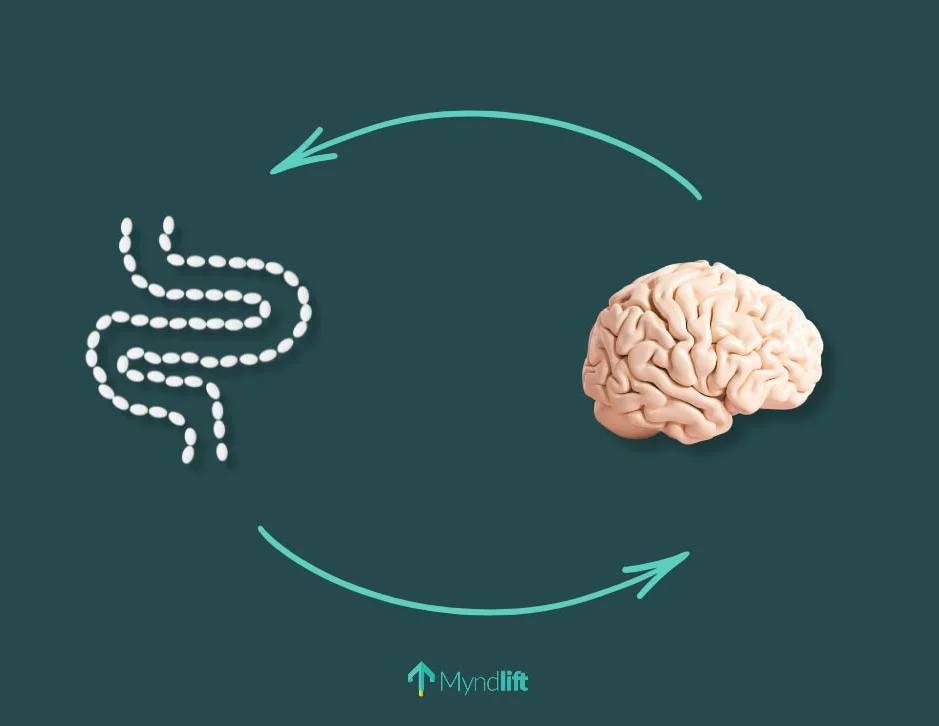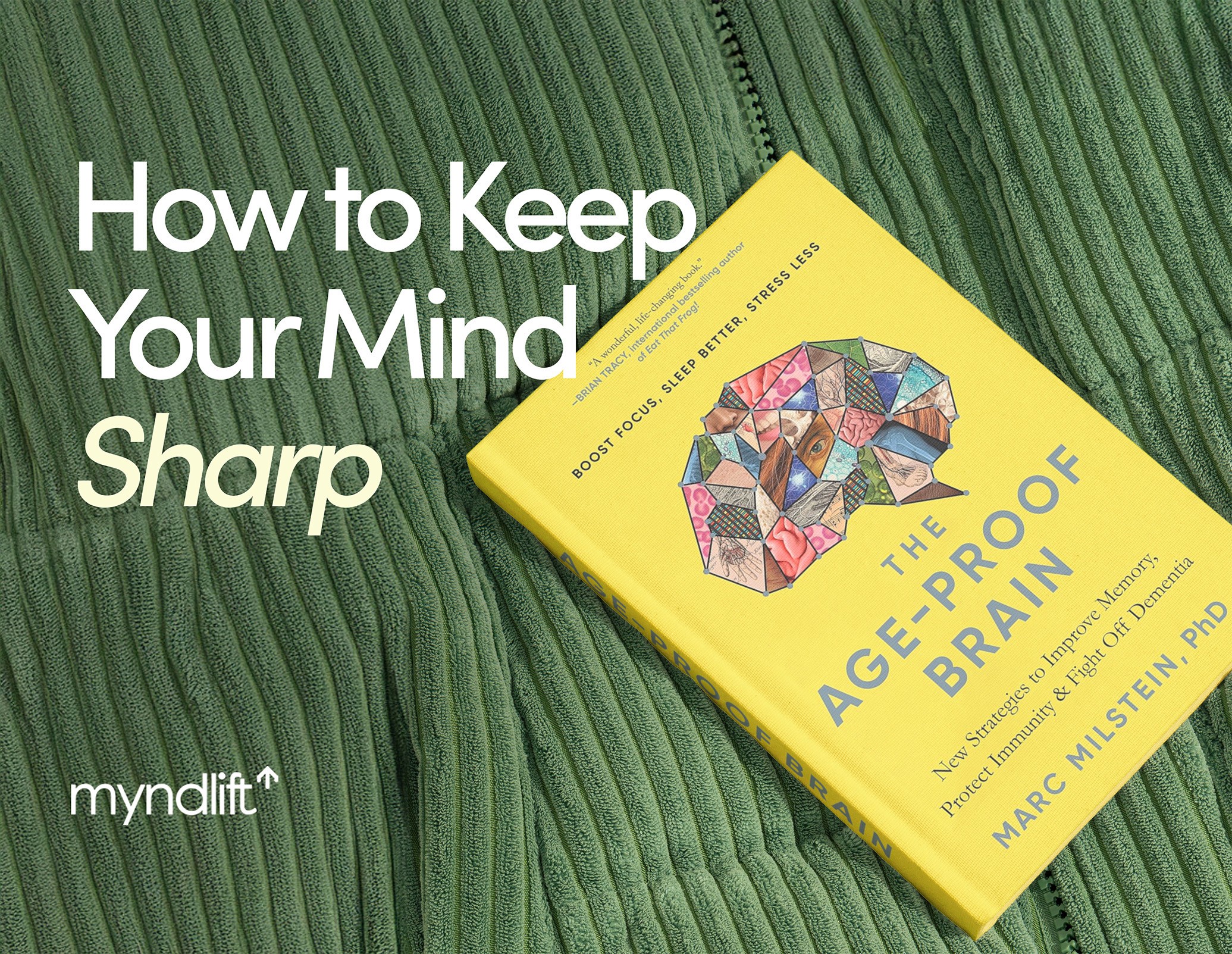We use the expressions “gut-wrenching” or “butterflies in the stomach” for a reason – our gastrointestinal system (our gut) is sensitive to emotions. So the next time you say you’re sick to your stomach, know that you mean that quite literally because our emotional state can trigger stomach issues and vice versa.
So why is our gut health so important and what does it have to do with anxiety? Can the gut cause anxiety? In this article we’ll explore these questions by addressing:
The Importance of Gut Health
Our general health is important to keep our bodies running in an optimal state. All body parts work together to achieve the goal of good overall health and performance. Just like the brain needs good mental well-being to stay healthy and function well, and the heart needs good cardio exercises for optimal heart health, your gut is the same.
Your body contains trillions of microorganisms that make up the gut microbiome. These microbes are found mostly in the intestines and each play a different role in your body. It sounds a bit unsettling, trillions of bacteria, viruses, and fungi inhabiting your body, but these microbes are actually extremely important to your physical and mental health.
They help to play a role in digesting, controlling the immune system, and even affecting brain function by producing chemicals that can influence your mood. These good bacteria also help to control the bad bacteria that might cause health problems by making it more difficult for bad bacteria to grow. The good bacteria do this by crowding the bad bacteria out and breaking down toxins that can produce the bad bacteria.
Poor gut health can lead to:
Bloating and inflammation: Problems like bloating and inflammation in the gut often lead to issues like pain, cramping, constipation, and/or diarrhea. This may be an indication that the bacteria in your gut is not breaking down foods the way they should or functioning properly.
Unintentional fluctuations in weight: Poor gut health may be the reason for any unintentional weight gain or loss. This is because gut bacteria affect how food is broken down and how many calories are extracted from the food. Thus if you have poor gut health, you may have less control over your weight.
Skin irritations: We usually associate skin irritations like acne with eating greasy or sugary foods. This may not be totally inaccurate, as it appears skin irritations can be related to poor gut health. Eating unhealthy foods can affect the balance of gut bacteria resulting in skin inflammation.
So not only does gut health contribute to healthy weight, a functioning immune system, and inflammation, but it can also be impacted by our mental health. This can be seen in gastrointestinal issues like:
Constipation
Cramping
Diarrhea
Nausea
Stress and anxiety can often lead to the gut health issues mentioned above, while poor digestive health may also lead to an increase in anxiety and stress – creating a circular cause-and-effect relationship. This relationship between our gut health and brain is called the gut-brain connection, or the gut-brain axis.
The Gut-Brain Axis
Our brain and gut are connected through millions of nerves and biochemical signaling, which allow the gut to send signals and messages to the brain and vice versa. The gut and mental health are linked through these connections, and that’s why the microbiome can affect the way your brain processes information.
The imbalance of microbes in the gut has been linked to increases in mental health conditions like anxiety and depression. So if you’re wondering if the gut can cause anxiety, according to research, the answer seems to be yes. Let’s look at the example of inflammation.
Studies have suggested that imbalances in the gut microbiota can lead to chronic low-grade inflammation, which can contribute to inflammation in the brain. This can occur because the gut microbiota produce various metabolites that can trigger an inflammatory response in the body. When these gut-derived metabolites cross the intestinal barrier and enter the bloodstream, they can activate immune cells in the brain, leading to neuroinflammation. Chronic neuroinflammation has been associated with several mental health conditions, including depression and anxiety.
But the question is not only whether the gut can cause anxiety, but whether anxiety can also cause gastrointestinal issues. The answer to that question also seems to be yes! When anxious, some of the hormones and chemicals released by your body can get into the digestive tract, interfering with digestion.
Tips to Improve Gut Health
If poor gut health is contributing to anxiety there are things you can do to improve its health and, hopefully, keep your anxiety in check as a result.
Here are some things that can help improve your gut health:
1. Exercise:
Regular exercise helps to activate digestive enzymes, improve blood circulation, and stimulate your nervous, muscular, and endocrine systems. Digestive enzymes are the proteins your body makes to break down food and aid in digestion. So exercise helps to activate these proteins to regulate digestion.
Regular exercise, such as walking, practicing yoga, or riding a bike, is typically defined as moderate activity for a duration of 30 minutes to 1 hour per session, performed around 5 to 7 times per week.
Moderate activity can also be defined as anything that increases your heart rate and breaks a sweat. Some examples might include walking briskly for 30 minutes, riding a bike for 20 to 30 minutes, or doing 30 to 40 minutes of water aerobics.
2. Hydration:
Drinking enough water can help improve gut health by regulating your bowel movements, breaking down foods, and reducing inflammation. But how much water should you be drinking?
We’ve all heard the standard of drinking 8 glasses of water a day, but how much water your body needs can vary from one person to the next.
Because of individual variability like body weight, gender, physical activity level, environment(humidity/high altitude), alcohol intake, and illness - among other factors - it can be difficult to determine exactly the amount of water each person needs. Some examples of ways to check if you are getting enough fluids are:
Check the color of your urine. Darker urine may indicate you’re not drinking enough.
Are you experiencing headaches and/or fatigue? That may be a sign of dehydration.
A dry, sticky mouth may be a sign you’re not getting enough fluids.
Total fluid intake can include drinking water, water in beverages like coffee or tea, and water in food.
3. Eat a diverse range of foods
Eating a diet that is rich in whole grains, vegetables, legumes, and fruits can help improve gut health, as these are foods that are high in fiber and nutrients that are good for the healthy bacteria in your gut. Some good gut health foods are:
Raspberries
Artichokes
Green peas
Broccoli
Chickpeas
Lentils
Beans
Whole grains
Bananas
Apples
4. Eat more probiotic and prebiotic foods
Prebiotics are the foods that promote the growth of beneficial gut bacteria while probiotics are the good live bacteria that are found in certain foods. Examples of prebiotic foods are:
Oats
Onions
Asparagus
Garlic
While examples of probiotics are fermented foods like:
Kimchi
Sauerkraut
Pickled vegetables
Kombucha
Greek yogurt
Tips to Manage Anxiety
If you’re experiencing a situation in which it’s your anxiety that is contributing to unhealthy gut activity, there are things you can do to manage your anxiety as well and alleviate its symptoms.
For example, you can try:
1. Mindfulness Meditation
Mindfulness meditation teaches us how to slow down our thoughts, calm our minds and bodies, and let go of negative thinking. It’s a practice that involves deep breathing and focusing on your mind, body, and senses.
2. Therapy
Therapy is a great way to improve anxiety as you can discover and discuss your sources of anxiety and also learn skills to alleviate the symptoms. One of the most effective forms of therapy for anxiety may be cognitive behavioral therapy.Though, now-a-days, many therapists use integrative approaches that combine different types of therapy to meet individual needs. So you and your therapist will work together to determine what therapy may be best suited for you.
Cognitive behavioral therapy (CBT) is a form of talk therapy that focuses on the relationship between thoughts, emotions, and behaviors. It is based on the idea that our thoughts influence our emotions and behavior, and by changing our thoughts, we can change our emotions and behaviors. The goal of CBT is to identify negative thoughts and irrational beliefs and modify them towards more realistic and helpful thoughts.
3. Brain Training with Neurofeedback
Training your brain with neurofeedback is a great, non-invasive, method for alleviating anxiety symptoms. How does it work exactly?
In your brain, there are patterns of electrical activity that are constantly occurring. These patterns, called brainwaves (delta, theta, alpha, beta, and gamma), are associated with different states of consciousness, including alertness, relaxation, and sleep, and can indicate when you're tired, focused, or relaxed.
In many cases, anxiety is associated with decreased alpha brainwaves and increased beta waves. Luckily, these dysregulated brainwave patterns can be rewired and transformed thanks to neuroplasticity, your brain's natural ability to change, adapt, and learn from experience.
With a type of brain training called neurofeedback, you can promote neuroplasticity and train your brain to self-regulate. And you can do it while listening to music, streaming your favorite TV show, or playing games. Here's how it works.
Learn if you’re eligible to proceed in brain training with neurofeedback from here.
Conclusion
The gut-brain axis shows that the gut and mental health are connected. An imbalance in gut microbes can cause anxiety, while anxiety and stress can affect gut health. By improving gut health with exercise, hydration, and a healthy diet and managing anxiety with mindfulness meditation, therapy, and neurofeedback, we can promote gut-brain connection and enhance overall mental and physical wellbeing.
So, it may not hurt to start paying attention to your gut health as a way of improving mental health. Of course no technique is one-size fits all and you should always consult a professional if you are struggling with physical or mental health concerns.
Myndlift provides supervised brain training that can be practiced from the comfort of your home. Contact us to understand your brain and nurture your mental health from here.
About the author:
Veronica Silver
Veronica Silver is a former therapist turned mental health/substance abuse writer. Her education and experience helps her write from a place of knowledge and compassion. Her goal is to not only to inform, but to get individuals to connect with the information and resources.
About the checker:
Kaija Sander, Ph.D.
Kaija Sander is a cognitive neuroscientist and scientific consultant for Myndlift. She holds a BSc in Biomedical Science with a specialization in Neuroscience and Mental Health from Imperial College London and a PhD in Neuroscience from McGill University. Her doctoral research focused on brain connectivity relating to second language learning success. She is passionate about the broader applications of science to have a positive impact on people’s lives.
References
Bull, M. J., & Plummer, N. T. (2014, December 13). Part 1: The human gut microbiome in health and disease. Integrative medicine (Encinitas, Calif.). Retrieved April 22, 2023, from https://www.ncbi.nlm.nih.gov/pmc/articles/PMC4566439/
Carlson, J. L., Erickson, J. M., Lloyd, B. B., & Slavin, J. L. (2018). Health effects and sources of prebiotic dietary fiber. Current Developments in Nutrition, 2(3). https://doi.org/10.1093/cdn/nzy005
Chand, S. P., Kuckel, D. P., & Huecker, M. R. (2022). What is cognitive behavior therapy (CBT)? StatPearls [Internet]. https://doi.org/https://www.ncbi.nlm.nih.gov/books/NBK470241/
Clapp, M., Aurora, N., Herrera, L., Bhatia, M., Wilen, E., & Wakefield, S. (2017). Gut microbiota’s effect on Mental Health: The gut-brain axis. Clinics and Practice, 7(4), 987. https://doi.org/10.4081/cp.2017.987
Clauss, M., Gérard, P., Mosca, A., & Leclerc, M. (2021). Interplay between exercise and gut microbiome in the context of human health and performance. Frontiers in Nutrition, 8. https://doi.org/10.3389/fnut.2021.637010
Clauss, M., Gérard, P., Mosca, A., & Leclerc, M. (2021). Interplay between exercise and gut microbiome in the context of human health and performance. Frontiers in Nutrition, 8. https://doi.org/10.3389/fnut.2021.637010
De Pessemier, B., Grine, L., Debaere, M., Maes, A., Paetzold, B., & Callewaert, C. (2021). Gut–skin axis: Current knowledge of the Interrelationship between microbial dysbiosis and skin conditions. Microorganisms, 9(2), 353. https://doi.org/10.3390/microorganisms9020353
Ensle, EdD, RDN, FAND, CFCS, K. (2019, March). Signs you are not drinking sufficient water. Signs You are not Drinking Sufficient Water (Rutgers NJAES). Retrieved April 22, 2023, from https://njaes.rutgers.edu/sshw/message/message.php?p=Health&m=395
Kelly, J. R., Kennedy, P. J., Cryan, J. F., Dinan, T. G., Clarke, G., & Hyland, N. P. (2015). Breaking down the barriers: The gut microbiome, intestinal permeability and stress-related psychiatric disorders. Frontiers in Cellular Neuroscience, 9. https://doi.org/10.3389/fncel.2015.00392
Killer, S. C., Blannin, A. K., & Jeukendrup, A. E. (2014). No evidence of dehydration with moderate daily coffee intake: A counterbalanced cross-over study in a free-living population. PLoS ONE, 9(1). https://doi.org/10.1371/journal.pone.0084154
Loftfield, E., Herzig, K.-H., Caporaso, J. G., Derkach, A., Wan, Y., Byrd, D. A., Vogtmann, E., Männikkö, M., Karhunen, V., Knight, R., Gunter, M. J., Järvelin, M.-R., & Sinha, R. (2020). Association of Body Mass index with fecal microbial diversity and metabolites in the northern Finland birth cohort. Cancer Epidemiology, Biomarkers & Prevention, 29(11), 2289–2299. https://doi.org/10.1158/1055-9965.epi-20-0824
Madison, A., & Kiecolt-Glaser, J. K. (2019). Stress, depression, diet, and the gut microbiota: Human–bacteria interactions at the core of psychoneuroimmunology and Nutrition. Current Opinion in Behavioral Sciences, 28, 105–110. https://doi.org/10.1016/j.cobeha.2019.01.011
Sawka, M. N., Cheuvront, S. N., & Carter, R. (2005). Human water needs. Nutrition Reviews, 63, S30–S39. https://doi.org/10.1111/j.1753-4887.2005.tb00152.x
Sender, R., Fuchs, S., & Milo, R. (2016). Revised estimates for the number of human and bacteria cells in the body. PLOS Biology, 14(8). https://doi.org/10.1371/journal.pbio.1002533
Sjöstedt, P., Enander, J., & Isung, J. (2021). Serotonin reuptake inhibitors and the gut microbiome: Significance of the gut microbiome in relation to mechanism of action, treatment response, side effects, and Tachyphylaxis. Frontiers in Psychiatry, 12. https://doi.org/10.3389/fpsyt.2021.682868
U.S. Department of Health and Human Services. (n.d.). Irritable bowel syndrome (IBS) - NIDDK. National Institute of Diabetes and Digestive and Kidney Diseases. Retrieved April 18, 2023, from https://www.niddk.nih.gov/health-information/digestive-diseases/irritable-bowel-syndrome
Valdes, A. M., Walter, J., Segal, E., & Spector, T. D. (2018). Role of the gut microbiota in nutrition and health. BMJ. https://doi.org/10.1136/bmj.k2179
Won, E., & Kim, Y.-K. (2020). Neuroinflammation-associated alterations of the brain as potential neural biomarkers in anxiety disorders. International Journal of Molecular Sciences, 21(18), 6546. https://doi.org/10.3390/ijms21186546
Yang, Y. J. (2019). An overview of current physical activity recommendations in Primary Care. Korean Journal of Family Medicine, 40(3), 135–142. https://doi.org/10.4082/kjfm.19.0038





